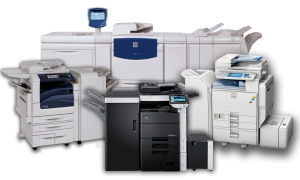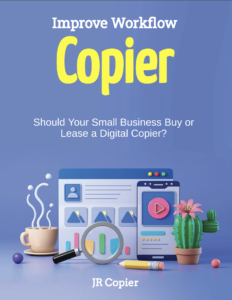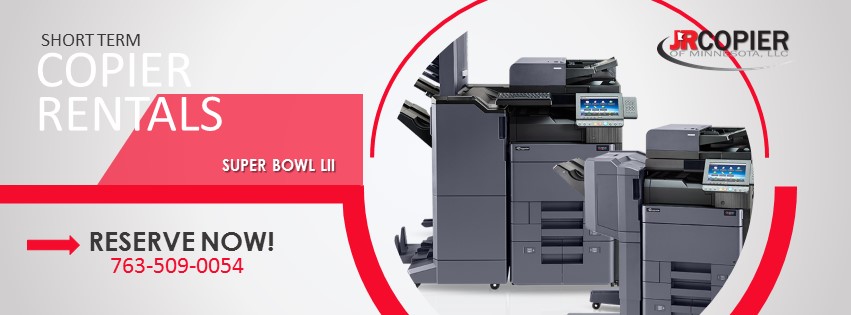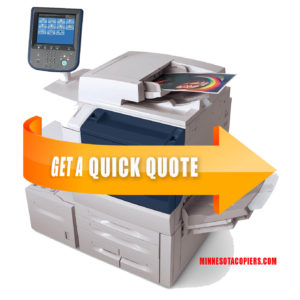Frequently Asked Questions when Leasing or Buying a Copier in the Minneapolis St. Paul Metro Area
I would like to offer 25 years of personal experience, condensed in the next few paragraphs. Should you buy or lease a copier? Sometimes this can be a daunting task, especially if you are an office manager or executive assistant who has been assigned to this decision. In future articles, I will be addressing how to compare the actual copier companies and their sales approach. But for now, there is some ground to cover that is fundamental to this assignment.
Leasing a Copier (also called an MFP, for Multi-Function Peripheral) is an extended payment option for businesses or private parties who need to upgrade or replace their current equipment with flexible payment terms. Leasing allows you to pick a payment term (anywhere from 12-64 months in most cases) and lease type (FMV or $1 out). The difference is, FMV leases are simple and are the most common leases executed within the copying and printing industry. FMV stands for Fair Market Value, which means at the end of lease term, the customer or buyer (the Lessee) has the option to purchase the machine for sole ownership at that time for its Fair Market Value. This is an appraised value that is determined by the bank issuing the lease (the Lessor). A $1.00 out Lease, or “buck out” is even easier. It is identical to a FMV lease, but the only difference is what happens at the end of the leasing term. Once your lease comes to fruition, instead of the option to buy your machine for the fair market value, the bank states the value of the machine at the beginning of your lease term (instead of the end), which of course is $1.00. So, you own your machine for a buck when your lease is over. Of course there is a catch here- your payments are higher than that of an FMV lease.
Below are answers to more frequently asked questions about MFP/Copier Leasing & Purchasing
•Should I lease, rent or buy a copier?
•How much does it cost to lease a copier?
•What is the difference between leasing and renting a copier?
•What is the average length of a copier lease?
•What speed copier should I buy or lease?
•Should I buy or lease an inkjet, laser copier, or digital copier?
Should I lease, rent or buy a copier?
This is often the most difficult question asked when making this decision. Here is some advice. Typically it makes sense to lease a machine if you are confident that you are capable of paying your monthly payment, each month on time, for the entire duration of that lease term. It also makes sense to do this if you are trying to conserve capital for other expenditures. Leasing (and renting) also qualify differently for deductions; under most standard accounting practices leasing and renting a copier can be written off entirely each month whereas a direct purchase must be depreciated over time. However, Election 179 counters this measure; consult with a CPA or tax attorney for specific details.
Renting a copier is great if you are sure you only need a machine for short duration and will not have a need for its use again over a long duration. Renting is very popular with trade shows, accounting practices during tax season or law firms who take a large case and need additional resources quickly. Typically renting involves a monthly rental fee that is fully inclusive of a pre-determined page / copy volume, toner, parts, labor, service etc. There are is also a delivery and pick up fee that apply as well.
Buying a copier is in most cases the most uncommon practice because you immediately own the machine from the minute you pay for it.
Service agreements are the second largest decision to make when purchasing a copier. Service agreements are basically a warranty for the equipment that you pay for monthly, that includes a certain page volume and all toner, parts, labor and consumables. In most cases it includes everything with the exception of paper and staples. Many buyers get easily misled here with service contracts; you do not need to lease a machine just to get a service contract. You can still get a service contract if you purchase a machine as well. Many dealers will bundle a service contract into the copier lease but this is NOT a good practice. Here is why-
Advantages to bundling a service or maintenance agreement into a copier lease: Also known in our company as “Golden Handcuffs”
You get 1 invoice every month instead of two. That’s it.
At JR Copier of MInnesota., we believe in the most ethical approach, which is NOT bundling your service contract into your lease.
Disadvantages to bundling a service or maintenance agreement into a copier lease:
1. The page volume is set in stone at the time of lease inception (so, if you “think” your volume will be 5,000 black and white pages per month and 1,000 color) then you sign your life away when you sign your lease. If you are wrong, and your true volume turns out to be 3,000 b&w and 100 color, tuff cookies! You signed up for 5000 and 1000 so that is what the bank will bill you for. This is often discovered after a few months into a lease, where a desire is expressed for change but, tuff cookies. The banks do not care, and you signed a contract which means you must pay it.
2. You get 2 invoices every month instead of 1.
3. You are locked in with the service provider and will NOT be able to transfer service elsewhere if you are not happy.
When does leasing a copier not make any sense?
If you are the owner of a new business and are concerned about long term survival, a lease may not make sense. A copier lease is almost always impossible to break, so if long term commitment is not in your future, then leasing is not a good idea. Additionally, most new businesses can have difficulty getting approval from a bank for a lease; expect to sign a personal guarantee if you have been in business under 2 years and are trying to get approval for a lease. Also, if your business makes fewer than 700 copies a month, it may not make sense to enter a leasing contract for a business-level or multifunction copier. You might consider buying an all-in-one copier, which is a smaller, usually desktop copy machine that can print, copy, scan, and fax just like a multifunction copier but at a slower speed. Make sure to look for a laser all-in-one copier rather than an inkjet copier, because inkjet ink is more expensive than laser toner. Inkjet printers have a price per page of around .20 cents, compared to laser printer pages which cost about .06 per page.
How much does it cost to lease a copier?
Most businesses pay an average between $100 and $650 a month to lease a multifunction copy machine. At JR Copier of Minnesota, we have leasing solutions that begin at $50.00 per month.
What is the average length of a copier lease?
Most leases conform to 12, 24, 36, 39, 48, 60, & 63 month terms. The most common lease chosen in the industry is 36 months FMV.
What speed copier should I buy or lease?
This is where people find themselves in “analysis paralysis”. What speed, what features, paper size, etc. This can be confusing and overwhelming at the same time. Most machines come standard with all of the bells and whistles (Duplexing, collating, stapling, scanning, faxing, etc.). If this will be your office’s first copy machine, and your volume is around 3-5k per month (for color & b/w) then you should be fine with a machine that prints between 20-30ppm (pages per minute). Keep in mind that 30 pages per minute means you get 1 page every 2 seconds. What you need to do is really ask yourself and your staff what is most important to them when printing or copying, what they do with that job after it is printed or copied and how can this machine make you or your staff more efficient? Our line of machines allows you scan right to email from the machine, scan to a thumb drive, scan to your iPhone, print from your iPhone and more.
If you own a law firm or a business with a high volume of copies or prints, with several users on staff who use the machine frequently, then you should get a faster machine; at least 40 pages per minute and as high as 70ppm.
Should I lease an inkjet, laser copier, or digital copier? What is the difference??
Inkjet copiers or printers are never a good idea for any size of business because they are the most expensive and have the worst visual output. Inkjet devices have a cost per page of about 20-32 cents, per color page, while printers from a laser device costs about 6-9 cents per color page (b/w is approx. 9 cents on an inkjet and 1 cent or less on laser). Inkjet devices are also a lower capacity output, meaning that you’ll have to replace paper and ink two to three times more than a laser. Inkjet cartridges can also dry up if not used, which can lead to a repair of the ink head and a replacement of the costly cartridge. Last but not lease, inkjets are SLOW! They only real use inkjet devices have are for home or consumer use that is very infrequent. To sum it up, they don’t make any sense for a business whatsoever.
Laser copiers: A laser copier or printer is the most popular choice among businesses 
Digital Copiers: Most of today’s business or laser copiers are also called digital copiers. By “digital,” this means the device includes an internal scanner or fax, meaning the machine can scan and store documents. Scanning is very common these days as faxing is almost obsolete. This is very useful for most offices because devices can scan a document and then either store it immediately, fax it immediately or email it right from the copier. Once a document has been converted to digital, it can then be archived on your computer or server instead of a paper filing cabinet. What is even more important about this element is the retrieval process of that document when it is needed. It can be found with a simple keyword within that document instead of digging through paper files. Think about that- what if someone misplaces an important contract in your filing cabinet? It could take you hours or days to find it. Digital never has that problem because a simple word will retrieve the document for you.
Analog Copiers: At the time of this article being written (2014) I am quite confident that no one is producing analog copiers any longer. The difference between analog copiers and digital copiers is the technology. Analog copiers would have to scan a document ten times, in order to make 10 copies of it. A digital copier can remember the scanned document and make 10 copies of it after scanning it only once. Additionally, analog copiers could not print, scan or store documents.
If you are in the Twin Cities metro area and surrounding area, or west side of WI and would service or repair in our service area fill out the form below and I’ll get back to you ASAP.
As always feel free to ask me any copier buying or service question and I’ll do my best to give you a solid answer.
Thanks for stopping by.



